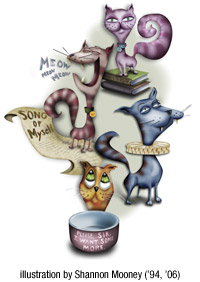 |
|||||||||||||||||
| |
Eagle Tale: Cat management Required reading for English majors -- by Meg M. Moring ('96 Ph.D.) While earning a Ph.D. in English at UNT, I learned a lot from my professors. I learned how to explicate a poem, how to decipher Elizabethan English, how to footnote properly, how to wrangle cats. Yes, cat wrangling. My English professors taught me everything I know about this valuable skill by allowing me into their book-lined homes to cat-sit. Here’s what I learned: “The Naming of Cats is a difficult matter,” according to poet T.S. Eliot. That’s because cats tend to live up to their names, and if you’re going to give a cat a literary name, well, then you’re in for it. Take Whitman, who belonged to an American Literature professor. Like the poet Walt Whitman, Whitman longed to explore America, and once his Song of Myself became so loud that his owners decided to let him out “just a little while” before leaving for a trip. Whitman was never seen again. I and several graduate students searched for Whitman in the professor’s absence. “Oh, Captain! My Captain!” we called to no avail. We concluded that Whitman had taken this poem to heart, sailed off into the high grass, and “fallen cold and dead” into the jaws of a coyote. Luckily, our grades did not hang on whether we retrieved his body or not. “Americans [and their cats], while occasionally willing to be serfs, have always been obstinate about being peasantry.” This pearl of wisdom from F. Scott Fitzgerald’s The Great Gatsby applied to Zelda, who was named after Fitzgerald’s wife by her owner, the chair of the English department during my time at UNT. Zelda the Siamese knew how to play cat sitters. She could be submissive as a rug, allowing me to stroke her thick, gorgeous fur as if she were there for my pleasure. But if I ordered her off my stack of notes so I could study, she merely wrapped her mink stole tail around her sooty nose, flexed her long claws and ignored me. Dickens stole the line “Please, sir, I want some more” in Oliver Twist from a cat. Dixie, another of the chairman’s cats, had the orphan act down pat. She had been found as a half-dead kitten under an I-35 overpass during pouring rain and nursed back to health with tuna in china bowls. Dixie required a handful of Pounce to be dispensed whenever she appeared on my chest, looking frail and waifish, at 2 a.m. My internship as a cat wrangler was not limited strictly to professors’ cats. I had my own cats, dutifully named after literary figures, and they indeed lived up to their names. Willie (Shakespeare) believed “all the world’s a stage” and took his act on the road. We finally found him after he did the Oliver Twist bit outside the State Club, conning two students to take him in and call the number on his ID tag. This was after his picture appeared in the North Texas Daily under the caption “playful stray,” so we knew he was somewhere on campus. Ophelia simply slipped away somewhere one day, and Falstaff, who enjoyed the good life, died of heart failure. When my husband and I left Denton, we took with us a solid black kitten we’d found under the stadium, where we often went to run around the track. Thomas Hardy’s poem “Snow in the Suburbs” drove us to keep her:
As you can see, I was well trained to handle the situation.
|
||||
|
|
